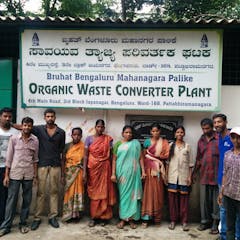
Artikel-artikel mengenai Waste management
Menampilkan 1 - 20 dari 65 artikel

Existing laws and regulations failed to prevent asbestos contamination of mulch. What’s missing is mandatory certification of recycled products so users can be sure they’ve been tested and are safe.

Methane is a potent greenhouse gas that can leak from oil and gas wells, pipelines and landfills. Satellites can spot the releases fast enough to get them fixed and help protect the climate.

An essential part of managing a growing global waste problem is sorting, recovering and recycling it. But you won’t see this on children’s shows that feature waste collection.

Volunteers have been collecting and sorting washed-up rubbish on the beach for years. Thanks to their efforts, we have data on whether container deposit schemes help the issue.

New research shows that Americans may have absorbed public messaging about the importance of recycling too well.

Lagos has a waste problem that can be tackled by adopting a sustainable waste management policy that considers income brackets.

The overarching goal of Indigenous cultural practices is to prevent the overconsumption of resources that underpins society’s throwaway culture.

To focus on sustainable development goals, platforms need to change from being exclusively focused on profits and value appropriation to perceiving themselves as public goods.

Humans generate a lot of trash, but there are cheaper and safer ways to handle it than loading it on rockets.

The recovery rate from construction and demolition waste has been rising steadily in Australia. However, the use of recycled materials is still not the norm across the construction industry.

Apartments have lower waste recycling rates than houses, which means the growing numbers of apartment dwellers could add to Australia’s waste management crisis. But there are solutions to the problem.

Most food waste still goes into red bins of mixed waste bound for landfill. It’s using up precious landfill space and harming the environment when it could produce valuable compost and biogas instead.

Many countries export their plastic waste abroad – but the mismanagement of this plastic waste is one of the leading causes of plastic pollution in nature.

The decision by African ministers of environment to end open waste burning will not only save lives but also open up new income streams.

Could we divert incontinence products from landfill? Yes – if we tackle social stigma and access to affordable health services, encourage biodegradable products and introduce supportive waste policies

Experts share their insights into Nigeria’s flooding challenge and steps needed to alleviate their worst effects.

Here’s some good environmental news – local governments and local actions have slashed the plastic on our beaches. Incentives, awareness and access are the key.

‘Smart’ solutions to urban solid waste are creating serious challenges for low-income women waste workers in India.

Human waste created the landscape for a medieval Indian Ocean trading port and may eventually have led to its demise.

Representatives of 175 countries voted to start developing a global treaty to reduce plastic waste. Treaties addressing mercury, long-range air pollution and ozone depletion offer some lessons.
